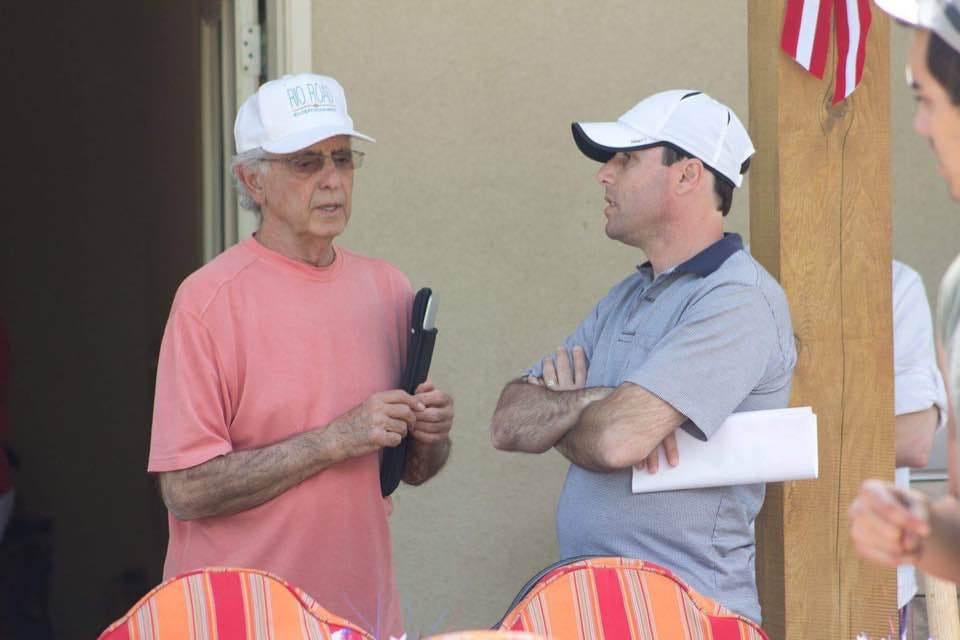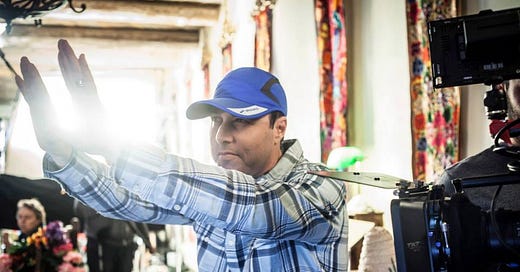The Art of Failure
"By continuing to fail, flop and stumble, I hope I can serve as an inspiration to others to persevere in the face of adversity. I truly look forward to getting knocked on my ass."
By Ross Kagan Marks
I’ve made 17 movies. Some long. Some short. Some big. Some small. Some good. Some bad. I’ve worked with three Academy award winners: Al Pacino, Brendan Fraser and Faye Dunaway.
I’ve even won a few awards. But the greatest skillset I’ve developed in my life is the one that allows me to fail — and then bounce back. I am an expert in failure and rejection.
As an educator, I teach my students at New Mexico State University how to try — and how to fail. If something works, put it in your toolbox and use it again. If it doesn’t work and you fail — great! You know not to do it again. Failure is unquestionably life’s greatest teacher. I truly believe that the next best thing to playing and winning is playing and losing.
My favorite quote from my favorite movie scene ever is in “Rocky IV.” Yes, a “Rocky” sequel. Not a great sequel. Not a great movie. Not even top 1,000. My favorite movie is John Ford’s The Searchers. But that’s another article.
In Rocky IV, Rocky has a talk with his son about life. He gives the following advice to Rocky Jr.:
“Let me tell you something you already know. The world ain't all sunshine and rainbows. It's a very mean and nasty place and I don't care how tough you are, it will beat you to your knees and keep you there permanently if you let it. You, me, or nobody is gonna hit as hard as life. But it ain't about how hard ya hit. It's about how hard you can get hit and keep moving forward. How much you can take and keep moving forward. That's how winning is done!”
My life mantra.

When I was in high school, I played varsity basketball. I was pretty good. Our team was excellent. I would ride the team bus on away games and sit by the window. As I contemplated the game and what lay in front of me, I would watch the houses go by with the TV glow coming from the windows and think:
“I could be inside that house watching The Loveboat and relaxing. Instead, I’m on this bus about to take on a huge challenge and push myself. I’m about to risk failure, risk losing, risk humiliation. Why?”
Because I had to. I had to test myself, push myself. Not only risk failure and losing. But embrace it. Just because you know the hit is coming doesn’t mean it hurts any less.
As I have grown older and my risks and failures bigger, I still ask myself why I put myself through it. Why do I keep getting in the ring and getting knocked down, for the number of knock-downs are far greater that the knock-outs.
It’s me. It’s how I was made. It’s in my DNA. It’s also a part of being Jewish.
In Judaism, failure is viewed as an inevitable part of life that serves as an opportunity for growth and self-improvement. The Jewish faith teaches that everyone will experience setbacks and challenges, but it is how one responds to these failures that ultimately determines their character and success. It’s their bounce-back ability that matters.
One of the central tenets of Judaism is the concept of teshuvah, or repentance. Teshuvah teaches that it is never too late to change and learn from one's mistakes. Failure is seen as a necessary step in the process of repentance, as it allows individuals to reflect on their actions and make amends for their wrongdoings. By acknowledging their failures and taking responsibility for them, individuals can begin the process of teshuvah and work towards self-improvement.
In the Jewish tradition, failure is also seen as a test of faith and resilience. Judaism is another word for perseverance.
The story of Job in the Hebrew Bible serves as a powerful example of how one can maintain faith and perseverance in the face of failure and adversity. Despite losing his wealth, health, and family, Job remains steadfast in his belief in God and refuses to curse Him. Through his endurance and faith, Job ultimately overcomes his failures and is rewarded with a renewed sense of purpose and blessings.
Judaism teaches that failure is a natural part of the human experience and should be embraced as a learning opportunity. The Talmud, a central text in Jewish tradition, emphasizes the value of perseverance and resilience in the face of failure. Rabbi Tarfon, a prominent Jewish sage, once said, "It is not incumbent upon you to finish the task, but neither are you free to desist from it." This teaching encourages individuals to approach failure as a stepping-stone towards personal growth and self-improvement, rather than a reason to give up.
In Jewish culture, failure is also viewed as a means of building empathy and compassion towards others. The Jewish faith places a strong emphasis on acts of kindness and charity, and failure can serve as a reminder of the struggles and challenges that others face — by experiencing failure firsthand.
I would argue that Judaism is the religion of failure and recovery. By those metrics, I think I’m a good Jew. But it is also a religion of persistence and perseverance. And I hope that that makes me an even better Jew.
There have been many great Jewish leaders throughout history who faced failures before ultimately achieving success.
Moses is one of the most prominent figures in Jewish history, leading the Israelites out of slavery in Egypt and receiving the Ten Commandments on Mount Sinai. However, before assuming his role as a leader, Moses experienced failure when he killed an Egyptian taskmaster and fled into exile. Despite this setback, Moses eventually returned to Egypt and led his people to freedom.
King David is revered in Jewish tradition as a warrior, poet, and king of Israel. However, David faced significant failures in his life, including his affair with Bathsheba and the death of his son Absalom. Despite these setbacks, David is remembered for his repentance and devotion to God.
The Maccabees were a group of Jewish rebels who revolted against the oppressive rule of the Seleucid Empire in the second century BCE. The revolt initially faced setbacks and defeats, but ultimately resulted in the establishment of an independent Jewish State and the rededication of the Temple in Jerusalem.
Golda Meir was the first female Prime Minister of Israel and a pioneering leader in the Zionist movement. Before achieving political success, Meir faced a series of personal and professional setbacks, including the loss of her husband and financial struggles. Despite these challenges, Meir rose to prominence as a formidable political leader.
Failure is a common trait among Jewish leaders, yet the furthest thing from becoming an insurmountable obstacle. Through resilience, determination, and faith, Jews can overcome their failures and achieve great success. Anyone can!
By continuing to fail, flop and stumble, I hope I can serve as an inspiration to others to persevere in the face of adversity and continue moving forward despite life’s many hits.
I truly look forward to getting knocked on my ass.
ROSS MARKS is a writer, producer and director who teaches film at New Mexico State University. He is the founder of the Las Cruces Int’l Film Festival.
From unpacking history and politics to navigating the nuances of family and personal relationships to finding the human angle on sports and entertainment — plus our unsparing take on what’s happening in the Jewish world — the canvas at JEWDICIOUS is limitless! JOIN US!!






